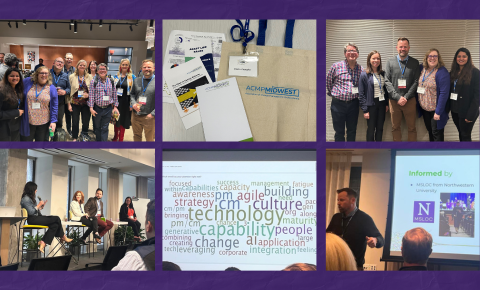More Human, More Tech: Takeaways from Midwest Change Conference
 On April 17, several hundred change management pros, including many members of the Northwestern MSLOC community, gathered in Chicago for the Midwest Change Conference hosted by our partners at ACMP Midwest. While presenters and attendees discussed many aspects of change management, the opportunities presented by blending humanity and technology (though not in a cyborg way) struck me as a key theme for further reflection.
On April 17, several hundred change management pros, including many members of the Northwestern MSLOC community, gathered in Chicago for the Midwest Change Conference hosted by our partners at ACMP Midwest. While presenters and attendees discussed many aspects of change management, the opportunities presented by blending humanity and technology (though not in a cyborg way) struck me as a key theme for further reflection.
Here are three of my key takeaways related to using technology enable greater humanity and using humanity to drive greater impact through technology.
Treat AI as a tool (not a weapon) and a colleague (not a competitor).
Technology and Digital Transformation is a “Top Change on Horizon” according to Prosci research. No surprise there. More novel was how Prosci’s Tim Creasey and several other presenters shared specific ways artificial intelligence (AI), among other technologies, is enabling change managers to work with and through people. As Creasey shared, “AI is not an oracle you ask questions to, it’s an intern you give instructions to. The better the instructions, the better the work.” And in their session, Stephanie Douglas, Ph.D. & Dr. James E. Sutton III from Embry-Riddle Aeronautical University talked about how AI can enhance our understanding and application of what people think and feel. In other words, AI is a great tool for sentiment analysis – let's get data from real people and have our AI colleague help us get to the crux of what those people need and want, thereby facilitating more informed decision-making.
Co-create deeper connection and psychological safety by aligning technology with culture.
During the closing panel, Michelle Yanahan from ChangeFit 360 spoke of the importance of psychological safety and people’s need to know, do, and feel. Most often we focus our attention, and thus our tools and technologies, on the first two (knowing and doing). Psychological safety depends on having the space to feel and having our feelings understood. As with the sentiment analysis example above, technology is among several important tools for greater understanding and informed action. Yanahan also spoke of opportunities for co-creation across change management work, understanding as well as normalizing change resistance, and enabling people not just to buy in but drive change work forward. Yanahan’s fellow panelist Cameron Cammarata from Northwestern Mutual spoke about integrating tools and systems for connecting people, making connections and processes easier and better. From knowledge management to project management and many systems in between, we know that if we can deeply understand and align our culture, our humans, and our systems, we can drive both greater performance and greater satisfaction.
Make change easier to chew on, swallow, and digest.
Panelist Hilary Lee from Centric Consulting stoked our appetites by encouraging us to enable a change culture through small moves. Changes that are “appetizer, tapas, or nugget-sized" can help us build change into our daily work without making our colleagues feel overstuffed or like the organization’s eyes are bigger than its stomach. Taking this philosophy to the people requires thoughtful use of technology that is responsive to the places and ways people are already working. As MSLOC alum Mark Henry, from Do Even Better, shared in his presentation, “When Change Management Adapts Like the Sales Team,” we must use multiple communication modes well to reach people, just like the best salespeople do. Henry advises to “write to be one-click forwarded,” bringing together these ideas of both finding people where they are and making it easy for them to consume and share.
I appreciated hearing each of these leaders and practitioners share specific examples of bringing technology to people, and people to technology, in real and complex ways that work. In our MSLOC courses and communities, we embrace this necessary complexity and work to equip ourselves and each other to integrate these skills and practices. Today's successful change managers must be ready to serve as knowledge managers, facilitators, leadership developers, coaches, designers, learning designers, project managers, and more. Doing so requires their deep understanding of how people work and the acuity with tools that make that work possible.